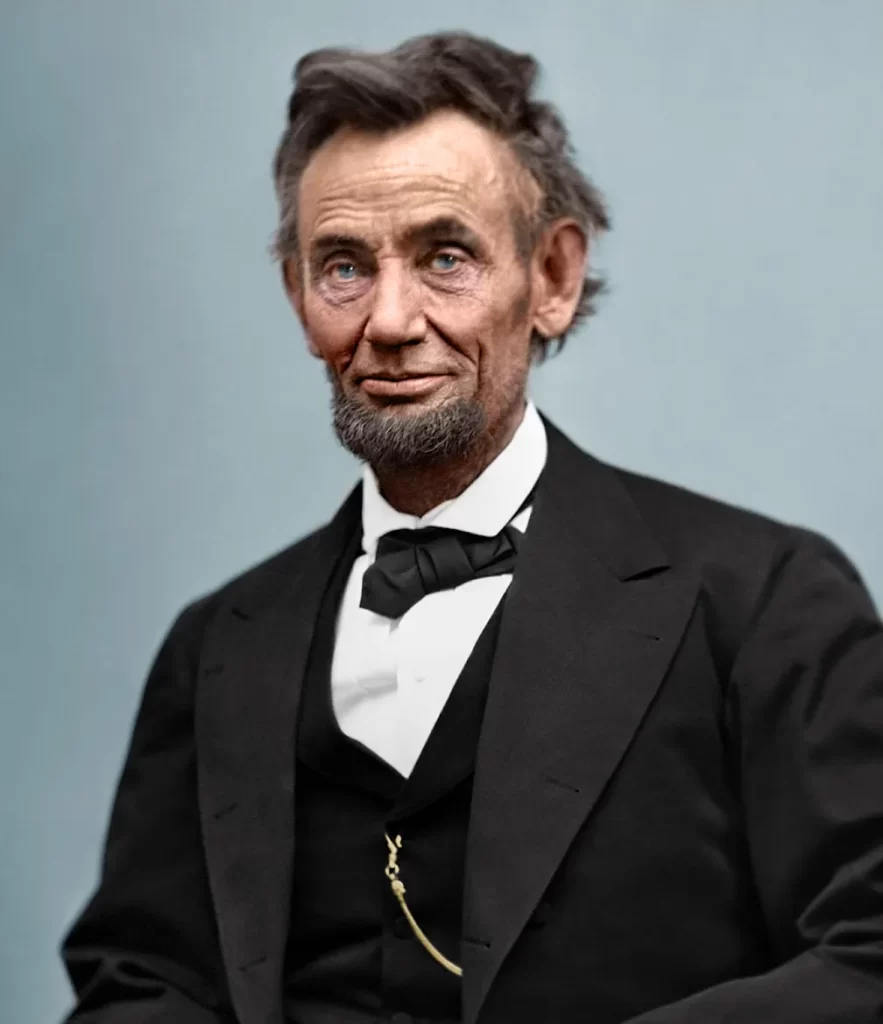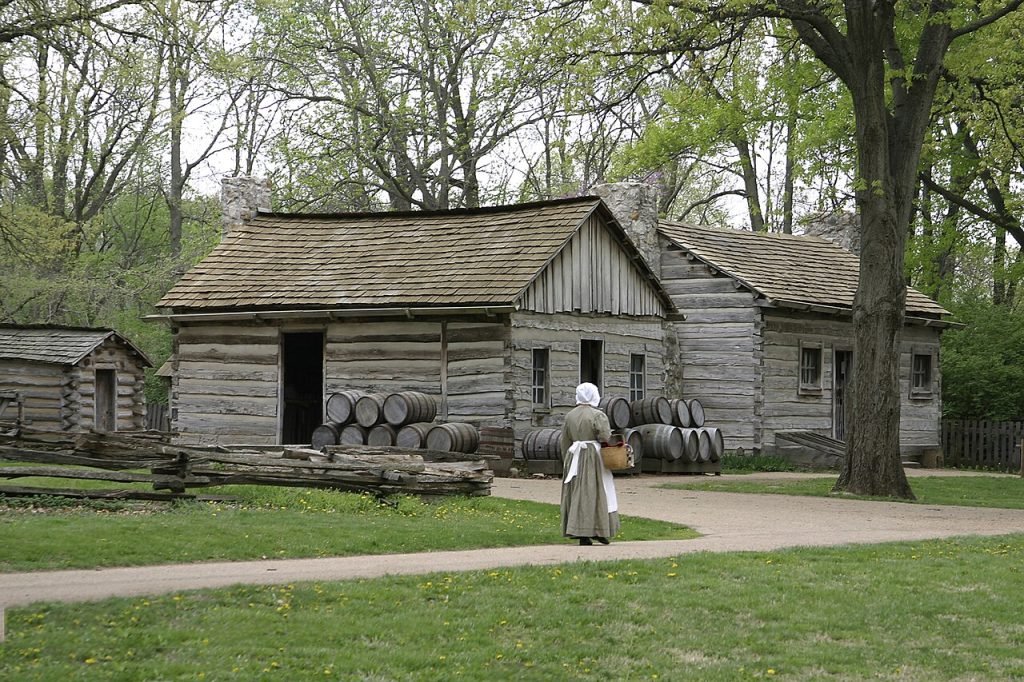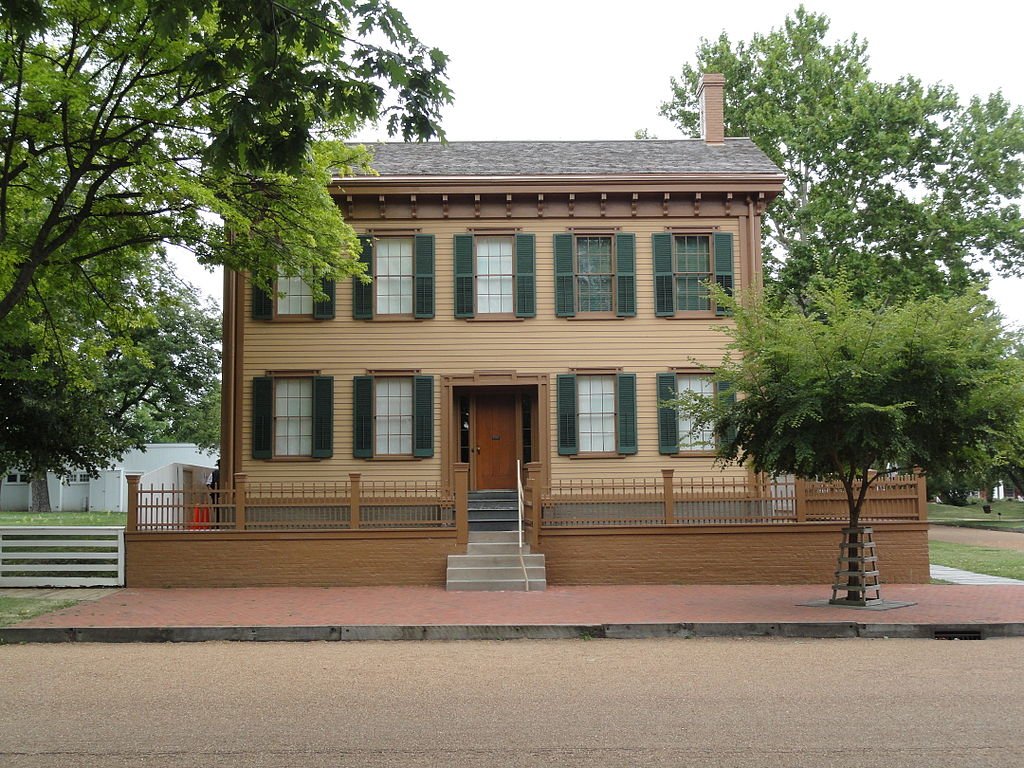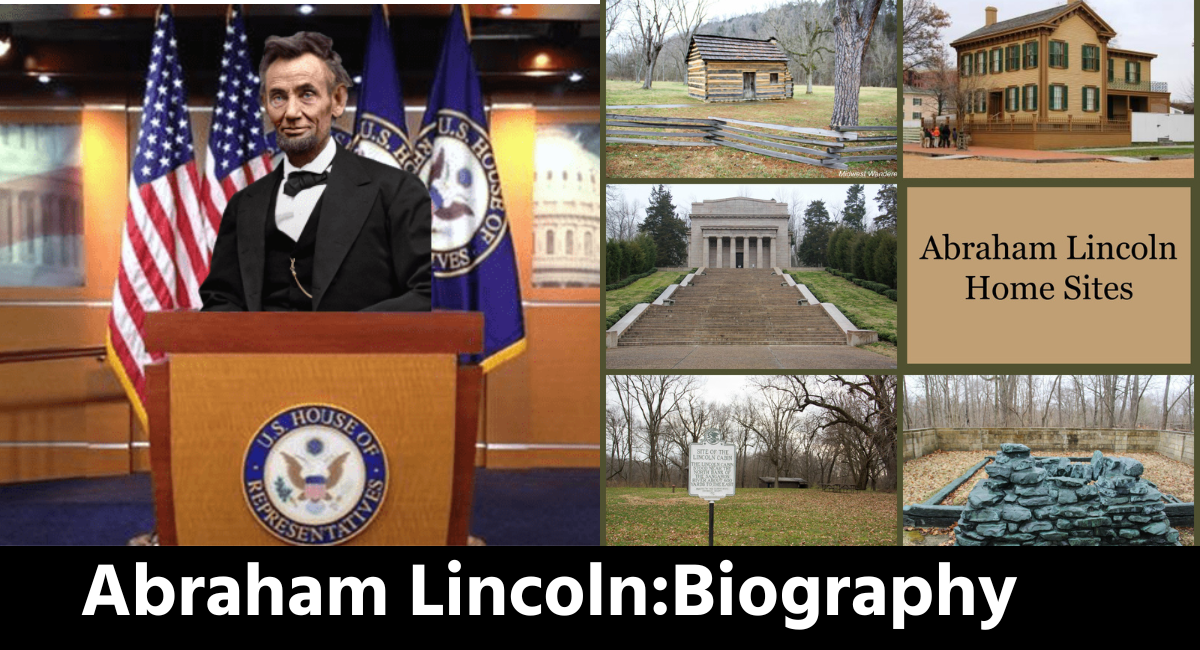Abraham Lincoln February 12, 1809 – April 15, 1865 was an American lawyer, politician, and statesman who served as the 16th president of the United States from 1861 until his assassination in 1865. Lincoln led the Union through the American Civil War to defend the nation as a constitutional union and succeeded in defeating the insurgent Confederacy, abolishing slavery, expanding the power of the federal government, and modernizing the U.S. economy.
Abraham Lincoln:Facts
- Born February 12, 1809,Sinking Spring Farm, Kentucky, U.S.
- Died: April 15, 1865 (aged 56)Washington, D.C., U.S.
- Manner of death : Assassination (gunshot wound to the head)
- Resting place : Lincoln Tomb
- Political party: Republican (after 1856)
- Whig: (before 1856)
- Other political: affiliations National Union (1864–1865)
- Height: 6 ft 4 in (193 cm)[1]
- Spouse :Mary Todd(m. 1842)
- Children:RobertEdwardWillieTad,
- Parents:Thoma,s Lincoln Nancy Hanks
Abraham Lincoln:Early life
Abraham Lincoln was born on February 12, 1809, the second child of Thomas Lincoln and Nancy Hanks Lincoln, in a log cabin on Sinking Spring Farm near Hodgenville, Kentucky He was a descendant of Samuel Lincoln, an Englishman who migrated from Hingham, Norfolk, to its namesake, Hingham, Massachusetts, in 1638. The family then migrated west, passing through New Jersey, Pennsylvania, and Virginia Lincoln was also a descendant of the Harrison family of Virginia; his paternal grandfather and namesake, Captain Abraham Lincoln and wife Bathsheba (née Herring) moved the family from Virginia to Jefferson County, Kentucky The captain was killed in an Indian raid in 1786 His children, including eight-year-old Thomas, Abraham’s father, witnessed the attackThomas then worked at odd jobs in Kentucky and Tennessee before the family settled in Hardin County, Kentucky, in the early 1800s.
The farm site where Lincoln grew up in Spencer County, Indiana

Lincoln’s mother Nancy Lincoln is widely assumed to be the daughter of Lucy Hanks. Thomas and Nancy married on June 12, 1806, in Washington County, and moved to Elizabethtown, KentuckyThey had three children: Sarah, Abraham, and Thomas, who died as an infant.

In Kentucky and Indiana, Thomas worked as a farmer, cabinetmaker, and carpenter. At various times, he owned farms, livestock, and town lots, paid taxes, sat on juries, appraised estates, and served on county patrols. Thomas and Nancy were members of a Separate Baptists church, which forbade alcohol, dancing, and slaver
Thomas Lincoln bought or leased farms in Kentucky before losing all but 200 acres of his land in court disputes over property titles. In 1816, the family moved to Indiana where the land surveys and titles were more reliable. Indiana was a “free” (non-slaveholding) territory, and they settled in an “unbroken forest” in Hurricane Township, Perry County, Indiana. In 1860, Lincoln noted that the family’s move to Indiana was “partly on account of slavery”, but mainly due to land title difficulties.
Abraham Lincoln:Mother’s death
On October 5, 1818, Nancy Lincoln died from milk sickness, leaving 11-year-old Sarah in charge of a household including her father, 9-year-old Abraham, and Nancy’s 19-year-old orphan cousin, Dennis HanksTen years later, on January 20, 1828, Sarah died while giving birth to a stillborn son, devastating Lincoln.

On December 2, 1819, Thomas married Sarah Bush Johnston, a widow from Elizabethtown, Kentucky, with three children of her own. Abraham became close to his stepmother and called her “Mother”. Lincoln disliked the hard labor associated with farm life. His family even said he was lazy, for all his “reading, scribbling, writing, ciphering, writing Poetry, etc.”. His stepmother acknowledged he did not enjoy “physical labor”, but loved to read.
Abraham Lincoln:Education and move to Illinois
Lincoln was largely self-educated. His formal schooling was from itinerant teachers. It included two short stints in Kentucky, where he learned to read but probably not to write, at age seven,and in Indiana, where he went to school sporadically due to farm chores, for a total of fewer than 12 months in aggregate by the age of 15. He persisted as an avid reader and retained a lifelong interest in learning. Family, neighbors, and schoolmates recalled that his reading included the King James Bible, Aesop’s Fables, John Bunyan’s The Pilgrim’s Progress, Daniel Defoe’s Robinson Crusoe, and The Autobiography of Benjamin Franklin. Despite being self-educated, Lincoln was the recipient of honorary degrees later in life, including an honorary Doctor of Laws from Columbia University in June 1861.
New Salem, Illinois
As a teen, Lincoln took responsibility for chores and customarily gave his father all earnings from work outside the home until he was 21. Lincoln was tall, strong, and athletic, and became adept at using an ax. He was an active wrestler during his youth and trained in the rough catch-as-catch-can style (also known as catch wrestling). He became county wrestling champion at the age of 21.He gained a reputation for strength and audacity after winning a wrestling match with the renowned leader of ruffians known as “the Clary’s Grove Boys”.
Lincoln cabin circa 1891 in Coles County
In March 1830, fearing another milk sickness outbreak, several members of the extended Lincoln family, including Abraham, moved west to Illinois, a free state, and settled in Macon County.e] Abraham then became increasingly distant from Thomas, in part due to his father’s lack of education.In 1831, as Thomas and other family members prepared to move to a new homestead in Coles County, Illinois, Abraham struck out on his own. He made his home in New Salem, Illinois, for six years.. Lincoln and some friends took goods, including live hogs, by flatboat to New Orleans, Louisiana, where he first witnessed slavery.
Abraham Lincoln:Marriage and children
Speculation persists that Lincoln’s first romantic interest was Ann Rutledge, whom he met when he moved to New Salem. Witness testimony, given decades afterward, showed a lack of any specific recollection of a romance between the two. Rutledge died on August 25, 1835, most likely of typhoid fever; saying that he could not bear the idea of rain falling on Ann’s grave, Lincoln sunk into a serious episode of depression, and this gave rise to speculation that he had been in love with her.

Lincoln was an affectionate husband and father of four sons, though his work regularly kept him away from home. The oldest, Robert Todd Lincoln, was born in 1843 and was the only child to live to maturity. Edward Baker Lincoln (Eddie), born in 1846, died February 1, 1850, probably of tuberculosis. Lincoln’s third son, “Willie” Lincoln was born on December 21, 1850, and died of a fever at the White House on February 20, 1862. The youngest, Thomas “Tad” Lincoln, was born on April 4, 1853, and survived his father but died of heart failure at age 18 on July 16, 1871. Lincoln “was remarkably fond of children”and the Lincolns were not considered to be strict with their own.In fact, Lincoln’s law partner William H. Herndon would grow irritated when Lincoln brought his children to the law office. Their father, it

seemed, was often too absorbed in his work to notice his children’s behavior. Herndon recounted, “I have felt many and many a time that I wanted to wring their little necks, and yet out of respect for Lincoln I kept my mouth shut. Lincoln did not note what his children were doing or had done.
Abraham Lincoln:U.S. House of Representatives (1847–1849)
True to his record, Lincoln professed to friends in 1861 to be “an old line Whig, a disciple of Henry Clay”. Their party favored economic modernization in banking, tariffs to fund internal improvements including railroads, and urbanization.
In 1843, Lincoln sought the Whig nomination for Illinois’s 7th district seat in the U.S. House of Representatives; he was defeated by John J. Hardin, though he prevailed with the party in limiting Hardin to one term. Lincoln not only pulled off his strategy of gaining the nomination in 1846, but also won the election. He was the only Whig in the Illinois delegation, but as dutiful as any participated in almost all votes and made speeches that toed the party line. He was assigned to the Committee on Post Office and Post Roads and the Committee on Expenditures in the War Department.Lincoln teamed with Joshua R. Giddings on a bill to abolish slavery in the District of Columbia with compensation for the owners, enforcement to capture fugitive slaves, and a popular vote on the matter. He dropped the bill when it eluded Whig support
Abraham Lincoln:Political views
Lincoln emphasized his opposition to Polk by drafting and introducing his Spot Resolutions. The war had begun with a killing of American soldiers by Mexican cavalry patrol in disputed territory, and Polk insisted that Mexican soldiers had “invaded our territory and shed the blood of our fellow-citizens on our own soil”.Lincoln demanded that Polk show Congress the exact spot on which blood had been shed and prove that the spot was on American soil. The resolution was ignored in both Congress and the national papers, and it cost Lincoln political support in his district. One Illinois newspaper derisively nicknamed him “spotty Lincoln”. Lincoln later regretted some of his statements, especially his attack on presidential war-making powers.
Abraham Lincoln:Presidency (1861–1865)
The South was outraged by Lincoln’s election, and in response secessionists implemented plans to leave the Union before he took office in March 1861. On December 20, 1860, South Carolina took the lead by adopting an ordinance of secession; by February 1, 1861, Florida, Mississippi, Alabama, Georgia, Louisiana, and Texas followed. Six of these states declared themselves to be a sovereign nation, the Confederate States of America, and adopted a constitution.The upper South and border states (Delaware, Maryland, Virginia, North Carolina, Tennessee, Kentucky, Missouri, and Arkansas) initially rejected the secessionist appeal. President Buchanan and President-elect Lincoln refused to recognize the Confederacy, declaring secession illegal. The Confederacy selected Jefferson Davis as its provisional president on February 9, 1861.

Lincoln cited his plans for banning the expansion of slavery as the key source of conflict between North and South, stating “One section of our country believes slavery is right and ought to be extended, while the other believes it is wrong and ought not to be extended. This is the only substantial dispute.” The president ended his address with an appeal to the people of the South: “We are not enemies, but friends. We must not be enemies…. The mystic chords of memory, stretching from every battlefield, and patriot grave, to every living heart and hearthstone, all over this broad land, will yet swell the chorus of the Union, when again touched, as surely they will be, by the better angels of our nature.”The failure of the Peace Conference of 1861 signaled that legislative compromise was impossible. By March 1861, no leaders of the insurrection had proposed rejoining the Union on any terms. Meanwhile, Lincoln and the Republican leadership agreed that the dismantling of the Union could not be tolerated. In his second inaugural address, Lincoln looked back on the situation at the time and said: “Both parties deprecated war, but one of them would make war rather than let the Nation survive, and the other would accept war rather than let it perish, and the war came.”

